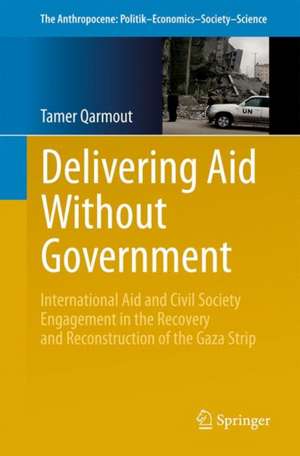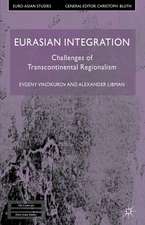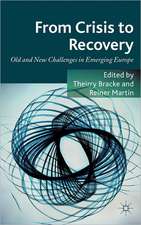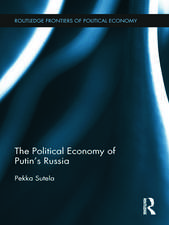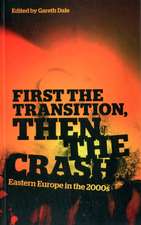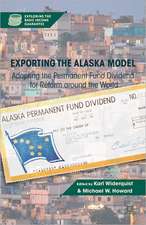Delivering Aid Without Government: International Aid and Civil Society Engagement in the Recovery and Reconstruction of the Gaza Strip: The Anthropocene: Politik—Economics—Society—Science, cartea 7
Autor Tamer Qarmouten Limba Engleză Paperback – 18 mai 2017
Din seria The Anthropocene: Politik—Economics—Society—Science
-
 Preț: 403.48 lei
Preț: 403.48 lei -
 Preț: 361.89 lei
Preț: 361.89 lei -
 Preț: 380.63 lei
Preț: 380.63 lei - 20%
 Preț: 583.00 lei
Preț: 583.00 lei -
 Preț: 389.49 lei
Preț: 389.49 lei -
 Preț: 390.46 lei
Preț: 390.46 lei - 5%
 Preț: 361.80 lei
Preț: 361.80 lei -
 Preț: 379.09 lei
Preț: 379.09 lei -
 Preț: 384.48 lei
Preț: 384.48 lei -
 Preț: 380.84 lei
Preț: 380.84 lei -
 Preț: 451.26 lei
Preț: 451.26 lei -
 Preț: 391.40 lei
Preț: 391.40 lei -
 Preț: 430.21 lei
Preț: 430.21 lei -
 Preț: 387.75 lei
Preț: 387.75 lei -
 Preț: 378.34 lei
Preț: 378.34 lei -
 Preț: 418.29 lei
Preț: 418.29 lei - 5%
 Preț: 399.91 lei
Preț: 399.91 lei -
 Preț: 428.07 lei
Preț: 428.07 lei -
 Preț: 386.39 lei
Preț: 386.39 lei -
 Preț: 392.75 lei
Preț: 392.75 lei -
 Preț: 424.22 lei
Preț: 424.22 lei -
 Preț: 384.09 lei
Preț: 384.09 lei -
 Preț: 429.61 lei
Preț: 429.61 lei -
 Preț: 381.98 lei
Preț: 381.98 lei -
 Preț: 415.83 lei
Preț: 415.83 lei -
 Preț: 382.18 lei
Preț: 382.18 lei - 15%
 Preț: 647.40 lei
Preț: 647.40 lei - 18%
 Preț: 1123.04 lei
Preț: 1123.04 lei - 15%
 Preț: 579.34 lei
Preț: 579.34 lei - 18%
 Preț: 802.46 lei
Preț: 802.46 lei - 18%
 Preț: 944.51 lei
Preț: 944.51 lei -
 Preț: 383.33 lei
Preț: 383.33 lei -
 Preț: 383.33 lei
Preț: 383.33 lei -
 Preț: 383.33 lei
Preț: 383.33 lei -
 Preț: 413.66 lei
Preț: 413.66 lei -
 Preț: 417.52 lei
Preț: 417.52 lei
Preț: 380.07 lei
Nou
Puncte Express: 570
Preț estimativ în valută:
72.73€ • 77.77$ • 60.64£
72.73€ • 77.77$ • 60.64£
Carte tipărită la comandă
Livrare economică 17 aprilie-01 mai
Preluare comenzi: 021 569.72.76
Specificații
ISBN-13: 9783319496603
ISBN-10: 3319496603
Pagini: 136
Ilustrații: XVIII, 136 p. 3 illus. in color.
Dimensiuni: 155 x 235 x 8 mm
Greutate: 0.23 kg
Ediția:1st ed. 2017
Editura: Springer International Publishing
Colecția Springer
Seria The Anthropocene: Politik—Economics—Society—Science
Locul publicării:Cham, Switzerland
ISBN-10: 3319496603
Pagini: 136
Ilustrații: XVIII, 136 p. 3 illus. in color.
Dimensiuni: 155 x 235 x 8 mm
Greutate: 0.23 kg
Ediția:1st ed. 2017
Editura: Springer International Publishing
Colecția Springer
Seria The Anthropocene: Politik—Economics—Society—Science
Locul publicării:Cham, Switzerland
Cuprins
1 CSOs and Social Service Provision.- 2 Relevant Political Developments in Palestine and Governance under Hamas.- 3 International Aid, Civil Society Engagement, and the State Building Project in the Fragile Context of Palestine.- 4 International Donors and Local CSOs in Gaza: 2007-2013.- 5 The Hamas Government Involvement in Early Recovery and Reconstruction Schemes under the No-contact Policy .- 6 CSOs Engagement with International Donors and the Hamas Government to Plan and Implement Recovery and Reconstruction Schemes.- 7 International Donors’ Approaches to Respond to Early Recovery and Reconstruction Needs under the No-contact Policy.- 8 Summary and Discussion.
Textul de pe ultima copertă
In a fragile and conflict-ridden context such as the Gaza Strip, where the de facto Hamas government faces isolation and lacks international recognition, the provision of aid and development schemes challenges donors and CSOs delivering services to Palestinians. This volume examines how international donors influenced the reconstruction and recovery policy agenda as well as its implementation. Moreover, as a result of the no-contact policy, recovery and reconstruction schemes were delivered with limited involvement from the de facto Hamas government, raising questions about the efficacy of the “governance without government” concept. This book examines the dynamics and the impact of international donors’ financing of Civil Society Organizations that were involved in the reconstruction of the Gaza Strip. It expands on the existing analysis of transnational aid actors’ influence found in the public policy literature while contributing to our understanding of the concrete, and more specific, impact of international donors’ financing on the livelihoods of the Palestinian people.
Caracteristici
Offers insights on how donors influence public policies in contexts where local governments lack international recognition and legitimacy Examines the socioeconomic reality of the Gaza Strip under Hamas and the impact of international donors’ funded recovery and reconstructions schemes Investigates realities of donor assistance in conflict zones and the effect of conflict on development policies and priorities Includes supplementary material: sn.pub/extras
